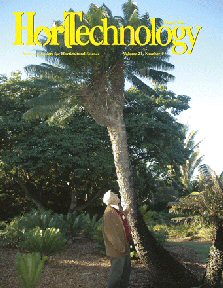 A new paper by the Montgomery team is the ‘cover article‘ in the August issue of HortTechnology. Titled Palma Corcho: A Case Study in Botanic Garden Conservation Horticulture and Economics, the study details the history of the Microcycas collections at MBC, and methods used for successful propagation of the species.
A new paper by the Montgomery team is the ‘cover article‘ in the August issue of HortTechnology. Titled Palma Corcho: A Case Study in Botanic Garden Conservation Horticulture and Economics, the study details the history of the Microcycas collections at MBC, and methods used for successful propagation of the species.
The paper also looks carefully at the economics of this species, via results from the MBC-FNGLA online auction. Microcycas calocoma is a very popular and highly sought after plant, but is difficult to grow. Making this species widely available can help to lower the price of the plants by meeting the high demand. Lowered price should correspond to reduced incentive for poaching of wild plants. Quoting from the study:
“. . . overcollection of wild plants is one factor leading to imperilment of natural populations.Thus, propagation and distribution of palma corcho can make a strategic contribution to in situ conservation. Provenance history of the living collections is reviewed, and techniques for propagation and establishment are detailed. An innovative botanic garden/industry partnership to provide seed for cultivation is discussed. Finally, we present analysis of market forces with regard to rare plant availability and conservation, using palma corcho as an example.”
Judy Kay, lead author on the study, has been managing the Montgomery Seedbank since 1998. Judy has fine-tuned a specialized protocol for propagating this cycad over the years, and sharing that protocol is one of the major goals of the paper. Judy states: “one of the best things I can do is to help other gardens propagate their Microcycas. MBC has sent pollen out to many places, and I always enjoy going to give demonstrations on the pollination method.”
